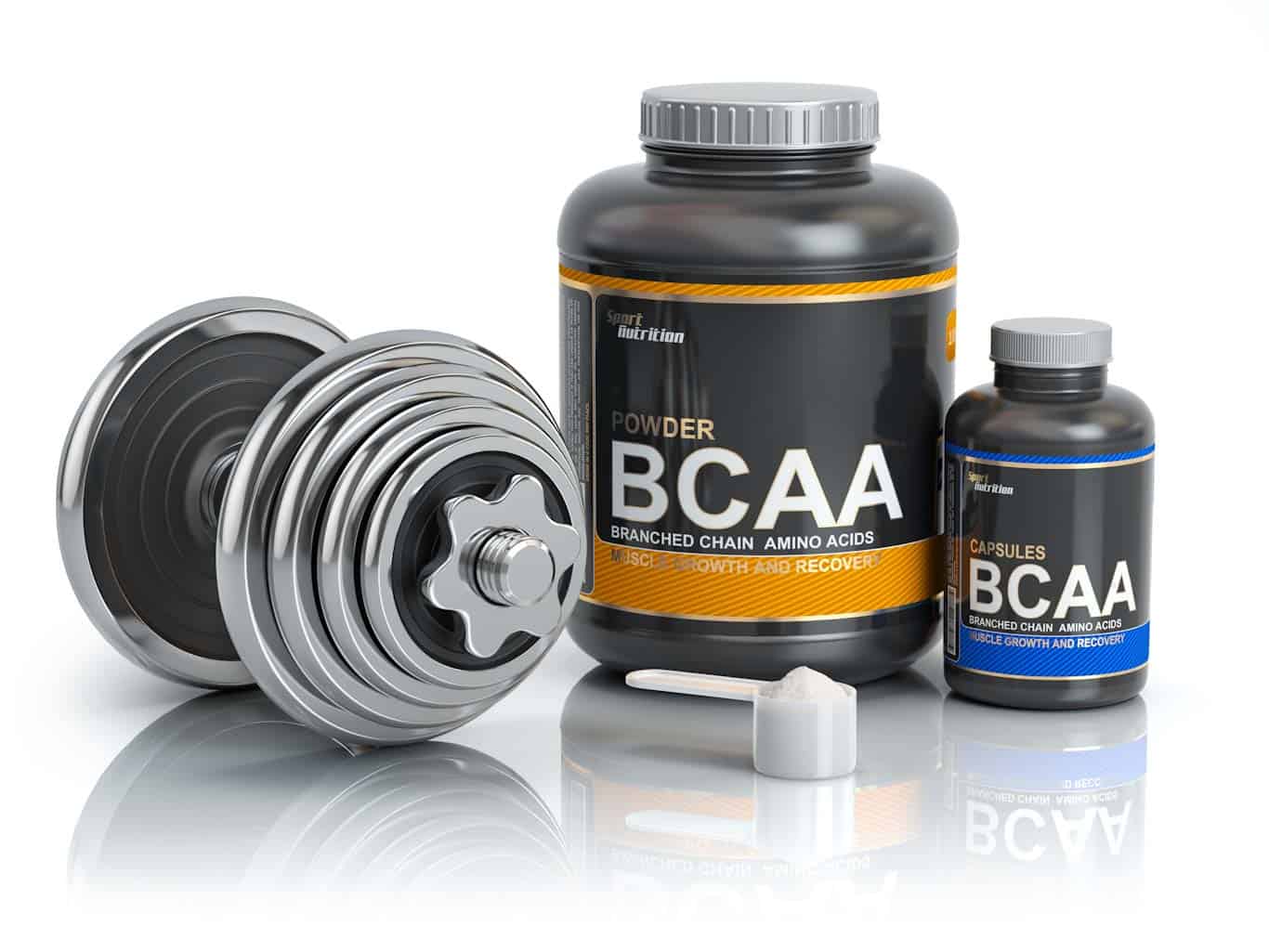Top 7 Benefits of BCAA Supplements

According to a 2019 survey, approximately 77% of American adults use different dietary supplements to benefit their overall health, and the most popular of these supplements is branched-chain amino acids (BCAA) powder.
BCAAs are a group of essential amino acids used by athletes and fitness enthusiasts for improving muscle mass and exercise performance. These include valine, leucine, and isoleucine, which together account for 14–18% of the total amino acids in muscle protein.
BCAAs cannot be produced naturally in the body and must come from food or supplements. This is why BCAA supplements have gained the attention of gym junkies to achieve their fitness goals without any nutrition gap.
In this article, we will look into the top seven benefits of BCAA supplements, as well as their side effects, and answer some frequently asked questions about them.

1. Builds strong muscles
Muscle building is the commonest and most popular use of BCAA supplements. Of the three BCAAs, leucine has the most direct effect on muscle growth. In fact, without leucine, muscle growth doesn’t even begin.
Leucine activates a certain pathway that instructs the body to shift into the state of growth called the anabolic state. This acts as a ‘green light’ to stimulate protein synthesis, which ultimately increases muscle mass.
In a recent 24-week study, the long-term effects of BCAA supplementation on parameters associated with sarcopenic patients have been assessed. It was found that treatment with BCAAs significantly improved sarcopenic parameters such as muscle strength, muscle mass, and muscle function.
In another study, carried out in 2017, it was revealed that people who consumed a drink with 5.6 grammes of BCAAs after a resistance training session had a 22% greater increase in muscle protein synthesis than those who consumed a placebo drink containing no BCAAs.
A well-rounded diet with BCAA supplementation is therefore a healthy and effective way to build strong muscles.
2. Supports the immune system
The immune system is the body’s defence against infectious agents such as bacteria and viruses. Without an effective immune system, the overall health of the body is at risk. Fortunately, BCAA supplements support this system too.
Human immune cells incorporate the BCAAs into the proteins and support the immune system.
According to a clinical review, lymphocytes, a type of white blood cell, utilise BCAAs for the synthesis of proteins, RNA, and DNA, which are all necessary for cell division.
All the BCAAs support and activate the immune system. For example, leucine plays a key role in T lymphocyte activation that switches on other immune cells and regulates immune response.
Isoleucine, on the other hand, increases the expression of special defence peptides that kill microbes. Valine also contributes to the immune function by promoting the maturation of dendritic cells that present infectious agents to the immune cells.
3. Reduces muscle fatigue after prolonged exercise
When it comes to cardio training, muscle fatigue is the major limiting factor. Fatigue can occur both centrally in the brain and peripherally in muscles and can affect your performance.
But thankfully, BCAA supplements provide an effective solution.
Normally during exercise, the muscles use up BCAAs, decreasing their levels in the blood.
When the levels of BCAAs decline in the blood the concentration of tryptophan in the brain increases. The tryptophan is then converted into another hormone called serotonin that causes fatigue. BCAAs interrupt this process by decreasing the concentrations of the essential amino acid tryptophan in the brain, thereby delaying central fatigue.
BCAAs reduce peripheral fatigue by acting as an additional energy source during prolonged workouts. A 2018 study suggests that BCAAs are the major fuel source for muscles after glycogen depletion. This means that BCAA supplementation prevents the deterioration of your physical performance, even after two or three hours of fitness training.
4. Prevents muscle loss
Not only do BCAA supplements increase muscle mass, they also prevent muscle wasting.
All body cells are subjected to constant turnover. Similarly, muscle proteins are also broken down and rebuilt constantly.
Muscle wasting can be a sign of malnutrition, ageing, genetics, and some chronic conditions such as cancer.
A 2009 clinical review says that both resistance and non-resistance types of exercises tend to depress muscle protein synthesis while muscle protein breakdown remains unchanged. However, in the fasting state the net protein balance remains negative, as protein catabolism exceeds synthesis.
The only way to achieve a positive net protein balance is by increasing the availability of amino acids. BCAA supplementation before exercise results in decreased protein degradation and increased protein synthesis.
BCAAs activate key enzymes that switch on the anabolism of proteins.
A 2009 study also supports the theory that consumption of BCAA supplements during a resistance training program increases lean mass and muscle strength, and decreases body fat percentage.
5. Reduces muscle soreness and aids recovery
High-intensity resistance training can often cause something called exercise-induced muscle damage, or EIMD.
EIMD is associated with transient muscle inflammation, pain, strength loss, and, most importantly, delayed onset muscle soreness, or DOMS. DOMS symptoms typically occur at least 12 to 24 hours after exercise, says the American College of Sports Medicine.
High-intensity exercises can cause tiny, microscopic tears of muscle fibres due to the high tensions that can cause DOMS.
Two enzymes, creatinine kinase and lactate dehydrogenase, play a significant role in EIMD. Studies have shown that BCAA supplementation decreases serum activities of the intramuscular enzymes associated with muscle damage and ultimately reduces the symptoms of DOMS.
In one meta-analysis, people who ingested BCAA supplements reported a large decrease in DOMS symptoms compared to a placebo group.
6. Promotes weight loss
One of the well-known benefits of BCAA supplementation is weight loss. BCAAs prevent weight gain and promote fat loss.
According to 2015 research, a higher intake of BCAAs is inversely related to the prevalence of obesity, postprandial glucose tolerance, and status of inflammation.
BCAAs also help improve fat oxidation, the process that involves fat burning and energy production.
A 2014 study shows that the branched-chain amino acid leucine acts in the brain to suppress food intake but does not function as a physiological signal of low dietary protein.
This signifies that BCAA supplementation can help promote weight loss.
7. Helps balance cortisol levels
Interestingly, BCAA supplements can help balance blood cortisol levels and reduce stress. Cortisol is the stress hormone that is produced by the adrenal glands. When released in the bloodstream, cortisol helps regulate the body’s response to stress and affects several body functions.
BCAAs reduce stress and depression by competing with aromatic amino acids like tryptophan, tyrosine, and phenylalanine. These amino acids produce special chemicals called neurotransmitters and treat depression.
BCAAs compete with these amino acids to transfer from the blood-brain barrier, increasing their concentration in the blood which leads to reduced symptoms of depression.
This is the reason the levels of BCAAs are significantly lower in patients with major depression.
The authors of an experimental study on rats found that dietary supplementation of BCAAs reduced the exploratory behaviour of rats, a sign of increased anxiety.
Another study indicates that BCAAs mediate resilience to chronic social defeat stress.
Side effects of BCAA supplements
BCAA supplements are harmless, and their daily intake increases their effectiveness. However, just like any other substance, when consumed in large enough amounts BCAA supplements can cause side effects, including potentially negative side effects.
The safe daily dose of BCAAs is 12 grammes for men and 9 grammes for women for up to 2 years. Excessive consumption of BCAAs can cause:
- Fatigue
- Loss of coordination
- Nausea
- Headaches
- Increased insulin resistance leading to diabetes
- Bloating
- Diarrhoea
- Hyperkalaemia
- Dry mouth
- Lower extremities oedema
Experts suggest that BCAA supplements should be used cautiously before or during motor activities such as driving.
Due to some unexpected interactions, BCAA supplements are contraindicated for people with some health conditions, such as:
- Kidney diseases
- Liver diseases
- Heart problems
- Excessive alcohol consumption
- Maple syrup urine disease
Frequently Asked Questions
How much BCAA do you need per day?
It is more important to consume all three BCAAs in the correct ratios rather than taking them in large amounts. The ideal ratio is 2:1:1 of leucine to isoleucine to valine, which means for every 3 grammes of leucine you should have 1.5 grammes of isoleucine and 1.5 grammes of valine.
The recommended daily dose of BCAAs varies depending upon an individual’s gender and training requirements. For example, the recommended maximum dose of BCAA for women is 9 grammes per day and for men 12 grammes per day.
As athletes require more amino acids for muscle building and good performance, the daily recommended dosage for them is up to per day.
When to take BCAAs?
Most fitness experts advise taking BCAAs at least 30 minutes before a workout because levels of BCAAs in the blood peak around 30 minutes after consuming the supplement.
Taking BCAA supplements before a workout provides more energy and boosts muscle performance.
However, if your main goal is to build muscles and support faster muscle recovery, taking BCAA supplements after the workout can also help.
<<Best BCAA Supplements>>
Can pregnant women take BCAAs?
It is not recommended to use BCAAs during pregnancy or breastfeeding. The reason behind this is that BCAA supplements provide concentrated amounts of leucine, valine, and isoleucine, and it is not currently known how these might affect the pregnancy.
According to a 2020 study, consumption of BCAAs during the first 2-10 days of pregnancy can cause abnormal foetal and placental growth.
Conclusion − Why is BCAA good for you?
BCAA supplements are attractive to athletes and fitness enthusiasts because of their significant health benefits. These supplements help build strong muscles, support the immune system, reduce muscle fatigue, prevent muscle loss, aid muscle recovery, and reduce stress. Recommended safe doses of BCAAs for men, women, and athletes have been published. Excess consumption of BCAAs for a long time can cause some potentially negative side effects, so it is important to consult a doctor before taking them.














[…] Read More: Benefits of BCAA Supplements, Side Effects & FAQs […]
[…] intake. This is what a mass gainer does as it is full of calories, protein and vitamins, where as a protein powder is for increasing muscle a mass gainer is mainly for bulking up or in other words to put weight on […]
[…] Related guide: Benefits of BCAA supplements […]
[…] Top 7 Benefits of BCAA Supplements […]
[…] Top 7 Benefits of BCAA Supplements […]
[…] Top 7 Benefits of BCAA Supplements […]